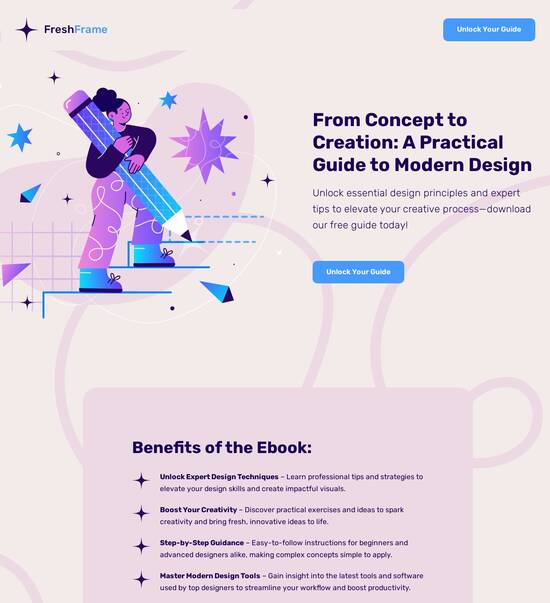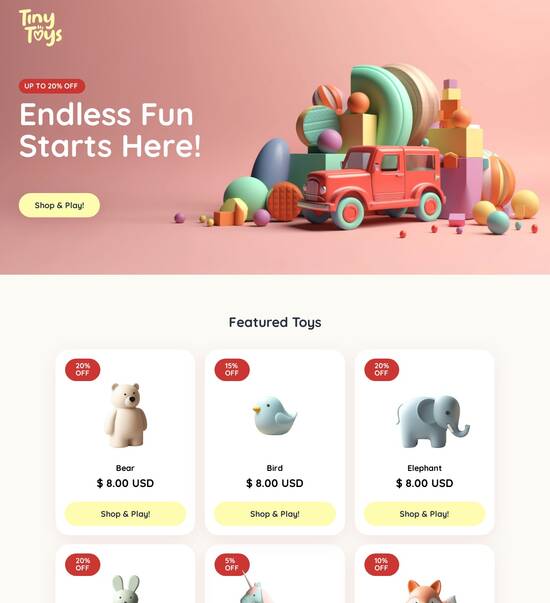
Disclaimer page template optimized for MacBook
Explore Similar TemplatesAbout template
Design using a responsive disclaimer page template that delivers a flawless experience on MacBook. Try Instapage today!
Recommended templates

Easy to build without coding
With the intuitive drag-and-drop builder, anyone on your team can create high-converting pages without any knowledge of code or design. Make enhancements to your landing page with custom widgets using Javascript, HTML/CSS, or third-party scripts.

Multiple layouts for any industry and goal
Select from 500+ landing page layouts built to boost conversions across industry-specific scenarios. Customize them by adjusting fonts, adding images, and generating on-brand content with the AI assistant. Quickly scale with Instablocks® and Global Blocks that you can save, reuse, and update globally.

Loads fast and looks polished on any device
Every template is responsive, which means they present professionally on any device and load blazingly fast with our Thor Render Engine. You can also power them up with Google AMP technology to deliver an unparalleled mobile experience and drive higher conversions.

Robust analytics & experimentation
Get real-time updates and reporting across all your devices, showing the number of visitors, conversions, cost-per-visitor, and cost-per-lead. Launch AI-powered experiments, run A/B tests, and use heatmaps to analyze user behavior, then optimize your landing page to maximize conversions.







Easy to build without coding
With the intuitive drag-and-drop builder, anyone on your team can create high-converting pages without any knowledge of code or design. Make enhancements to your landing page with custom widgets using Javascript, HTML/CSS, or third-party scripts.
Multiple layouts for any industry and goal
Select from 500+ landing page layouts built to boost conversions across industry-specific scenarios. Customize them by adjusting fonts, adding images, and generating on-brand content with the AI assistant. Quickly scale with Instablocks® and Global Blocks that you can save, reuse, and update globally.
Loads fast and looks polished on any device
Every template is responsive, which means they present professionally on any device and load blazingly fast with our Thor Render Engine.
Robust analytics & experimentation
Get real-time updates and reporting across all your devices, showing the number of visitors, conversions, cost-per-visitor, and cost-per-lead. Launch AI-powered experiments, run A/B tests, and use heatmaps to analyze user behavior, then optimize your landing page to maximize conversions.
All the features you need to build lead-generating landing pages
Explore more featuresLearn how to build top-performing landing pages for any goal
FAQs
Leading the way in building high-performing landing pages





A comprehensive guide to using Instapage for effective landing page creation and optimization
In today's highly competitive digital landscape, creating high-converting landing pages is crucial for any marketing strategy. Instapage stands out as the leading landing page and conversion rate optimization (CRO) platform, particularly beneficial for marketers across various verticals like business services, education, and technology. Its user-friendly features guarantee that even teams with limited budgets can accelerate their campaign performance and maximize ROI through powerful tools designed to enhance their digital efforts.
Selecting the right landing page template
Choosing the right landing page template is key to effectively capturing leads. Instapage offers an extensive library of over 100 templates, tailored for different industries and marketing goals. These templates are designed for conversion, ensuring you engage your audience from the moment they land on your page. An ideal template not only aligns with your brand's aesthetics but also incorporates persuasive elements that guide users towards taking specific actions.
- High-conversion elements: Look for templates that incorporate compelling headlines, strong calls to action, and clear value propositions to convert visitors into leads.
- Mobile responsiveness: Ensure the template is optimized for mobile devices, as a significant amount of web traffic comes from smartphones.
- Customization capabilities: Select templates that allow easy adjustments to align with your brand's unique messaging and design.
Building landing pages without coding
With Instapage, creating landing pages does not require any coding expertise. Use the intuitive drag-and-drop builder to customize your pages seamlessly.
- Drag-and-drop interface: Easily add text, images, and videos to your landing page without technical skills.
- Instablocks: Utilize pre-designed sections called Instablocks to save time on repetitive tasks while ensuring a cohesive design.
- Real-time editing: Make edits on the fly, and see your changes reflected immediately, optimizing the review process.
Optimizing for conversions with built-in tools
Optimization is vital for increasing conversions. Instapage offers built-in experimentation features that enhance your understanding of user behavior.
- A/B testing: Conduct A/B tests on different elements of your landing pages to identify the most effective variations.
- Heatmaps: Analyze user interaction with detailed heatmaps to see where visitors click and scroll the most.
- Analytics Dashboard: Track and assess performance metrics in a comprehensive dashboard for data-driven decision-making.
To maximize the effectiveness of your campaigns, leverage Instapage’s advanced features and keep refining your strategies based on insights gained.
In conclusion, Instapage empowers marketers with essential tools designed for success in landing page creation and optimization. By utilizing these resources, teams can significantly boost their online marketing efforts.
Get started today with Instapage and unlock the potential of your digital marketing campaigns. With easy-to-use tools and robust support, your path to higher conversions is just a few clicks away.
People also ask about Disclaimer page template optimized for MacBook
Disclaimer page template optimized for MacBook
Understanding the importance of a disclaimer page for MacBook users
A disclaimer page serves as a vital component of any website, especially for users accessing it on devices like the MacBook. This digital document outlines the rights and responsibilities of both the site owner and the visitors. Disclaimers can help manage user expectations and clarify any potential misunderstandings related to the content provided on the site.
In an era of stringent website compliance, having a well-crafted disclaimer showcases a site's commitment to transparency. This is particularly important for businesses and individuals operating within regulated industries. By presenting clearly defined disclaimers, site owners not only comply with legal obligations but also foster a sense of trust and professionalism among their users.
The role of disclaimers in website compliance
The necessity of clear communication in digital spaces
Enhanced trust: building user confidence through transparency
Essential features of a disclaimer page template for MacBook
A disclaimer page optimized for MacBook should be user-friendly and visually appealing. This means designing a responsive layout that ensures readability and accessibility across different screen sizes. It's crucial to consider MacBook-specific UI/UX features, such as smooth scrolling and touch gestures, which can enhance user interaction.
Customization options are equally important. A disclaimer page template should allow users to integrate their brand colors and logos, ensuring consistency with their overall branding strategy. Moreover, adjusting font styles to ensure readability is essential, particularly for MacBook users who might favor certain visual aesthetics. Customizable elements enable site owners to tailor the disclaimer page to reflect their unique brand identity while still fulfilling its primary function.
User-friendly design considerations
Responsive layout for different screen sizes
MacBook specific UI/UX optimizations
Customizable elements for brand integration
Adjusting font styles for readability
Step-by-step process to create a disclaimer page on MacBook
Creating a disclaimer page is a systematic process that can begin with selecting a template or building from scratch. Using pre-designed templates can save time and ensure a professional appearance, particularly for those who may not possess advanced web design skills.
Once a template is selected, the next step involves adding essential content. Important elements that must be included are statements about liability, copyright notices, and any affiliation disclosures. Crafting clear language is key; it should be straightforward and easy to understand, catering to a diverse audience.
Select a template or build from scratch
Adding essential content
Using the HTML widget for enhanced functionality
Incorporating a disclaimer popup on your website
Coding skills: the technical edge possible with MacBook
While a basic understanding of HTML and CSS can help in customizing a disclaimer page, MacBook users also benefit from various coding resources available for learning and implementation. Those comfortable with coding can create unique designs and functionalities. They can implement features such as styled headings, interactive elements, and seamless integration with other pages.
For those who want to streamline their processes further, pre-built snippets can serve as a quick solution. Experienced users may opt for advanced customization techniques like JavaScript for dynamic content or interactive disclaimers that adapt based on user behavior.
Basic HTML and CSS for customization
Pre-built snippets for quick integration
Advanced customization for experienced users
Benefits of integrating a disclaimer page in your web strategy
Integrating a disclaimer page into your web strategy provides significant benefits. First and foremost, it helps protect your brand by covering legal aspects, ensuring you have outlined your limits of liability and responsibilities clearly. This safeguard can be crucial in mitigating risks associated with potential legal disputes or misunderstandings.
Beyond legal protection, a well-structured disclaimer enhances the user experience. By communicating openly about the functions of your website and the data usage policies, you foster a sense of transparency. This not only builds trust but also encourages users to engage more fully with your content, knowing they understand what to expect.
Protecting your brand with legal coverage
Enhancing user experience through transparent practices
Maintaining compliance in a global digital landscape
Innovative applications of disclaimer pages
Disclaimer pages can serve various innovative applications across different types of websites. For e-commerce sites, they are essential for addressing refund policies and disclaiming liability for third-party links. Clearly outlining these points can prevent customer disputes and protect your business reputation.
On the other hand, blogs and personal websites can use disclaimers to clarify the purpose of their content. This could include disclosing any sponsorships, personal opinions, or financial advice, ensuring that readers are well-informed. Community platforms, frequently engaging with user-generated content, benefit from establishing clear ground rules to ensure a positive experience for all participants.
E-commerce sites: addressing refund policies
Blogs and personal websites: clarifying content purpose
Community platforms: setting ground rules
Guidelines for tailoring your disclaimer page
When crafting a tailored disclaimer, it’s essential to adhere to certain principles that ensure clarity and compliance. By using straightforward language and incorporating relevant legal references, you create a more reliable environment for users. Furthermore, it's vital to remain flexible as laws and industry standards evolve.
Utilizing testing tools available on MacBook, such as A/B testing features or analytics dashboards, allows you to gather valuable feedback on user engagement. This iterative design approach helps refine the disclaimer over time based on what resonates with readers, ensuring continuous improvement of user interaction.
Principles for crafting tailored disclaimer content
Using playgrounds for testing and feedback
How to leverage testing tools on MacBook
Iterative design: learning from user interaction
The synchronization capacity of disclaimer widgets
Incorporating disclaimer widgets on your website can simplify the management of disclaimers across multiple devices and platforms. These widgets ensure real-time updates, meaning any changes you make will instantly reflect anywhere your content is displayed, maintaining consistency in messaging.
Moreover, the configuration of these widgets offers efficiency in managing user data and feedback. Website owners can track user interactions with the disclaimer content, enabling them to evaluate its effectiveness and make informed decisions moving forward.
Real-time updates across multiple devices
Ensuring consistency in messaging
Effectively managing user data and feedback
Common pitfalls to avoid when creating a disclaimer page
While creating a disclaimer page, there are several common pitfalls that you should be cautious of. One major misstep is overloading the disclaimer with legal jargon, which can confuse readers rather than inform them. It is crucial to strike a balance that imparts necessary legal information without alienating your audience.
Another key consideration is neglecting mobile optimization. As user behaviors shift towards mobile browsing, ensuring your disclaimer page is optimized for mobile users is imperative. Finally, disregarding user engagement metrics can lead to wasted resources and missed opportunities for improvement. Always analyze interaction levels and feedback to enhance your content continually.
Overloading with legal jargon
Neglecting mobile optimization
Disregarding user engagement metrics
Future trends in disclaimer generation
The future of disclaimer generation looks promising, especially with the advent of automation tools that facilitate dynamic updates. These tools can automatically adjust content based on changes in legislation or user feedback, ensuring that disclaimers remain relevant and compliant without requiring constant manual input.
Additionally, advancements in AI and machine learning are set to revolutionize how site owners personalize disclaimers. By understanding user behavior patterns, these technologies can enable businesses to create customized experiences that align with individual visitor preferences, thereby enhancing user trust and satisfaction.
Automation tools for dynamic disclaimer updates
AI and machine learning in customization
Increased focus on user consent and data privacy
Final thoughts on best practices for a disclaimer page
Maintaining an effective disclaimer page is an ongoing process. It requires continuous evaluation and adaptation as laws evolve and user behavior changes. Regular updates ensure that your content remains accurate and relevant, reinforcing your commitment to transparency as a website owner.
Moreover, establishing a community of trust involves not just having a disclaimer but engaging with users by addressing their concerns and feedback. Overall, a well-devised disclaimer page reflects your professionalism and dedication to ethical practices, reinforcing your brand’s credibility in the digital landscape.
Ongoing evaluation: adapting to changes in law and user behavior
The importance of regular updates and revisions
Building a community of trust through continuous engagement
Ready to skyrocket conversions?
Supercharge your ad campaigns with high-performing landing pages
Get started














